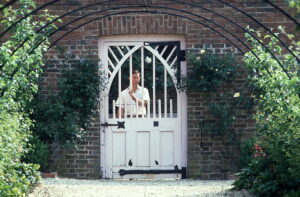Since the Princess of Wales withdrew from public life in January for planned abdominal surgery, her continued absence and relative Palace silence have prompted a frenzy of ever more deranged internet speculation. As the legacy press vacillated between fawning and the usual barely-disguised rubbernecking, the internet (and international coverage) went bananas.
Is William in fact a serial cheater? Has Kate left him? A clumsily edited family photo poured petrol on an already roaring bin-fire: perhaps in fact Kate is in a coma or even dead? Not even her announcement, via video, that she has cancer has convinced the internet that she is alive and well. Instead, the recording has been picked over for signs of AI fakery, and dissected by doctors on CNN. Someone deepfaked Meghan Markle making the same announcement, to prove it can be done. And even those willing to consider the possibility it is real have seized on the announcement for another round of Covid vaccination discourse, optionally seasoned with 5G and chemtrails.
A great deal of online response to the cancer announcement has assumed a public right to know. Fox News applauded her “new transparency”; others, meanwhile, complained at the lack of openness. Why couldn’t they be honest with the public about Kate’s illness? Why did they have to lie?
Behind all these complaints lurks the Royals’ ambivalent stance on a core aspect of contemporary culture: the co-dependent relationship between digital celebrities and their audiences. If the Prince and Princess of Wales seem paradoxically under fire today, at the very moment you’d expect them to elicit maximum public sympathy, it’s because their actions reveal them to be at best grudging participants in this world. The escalating madness of the Kate truthers is, in other words, a punishment for her own clear lack of interest in playing the influencer game.
If we have developed a co-dependent relationship with celebrities, it is a byproduct of our revealed preference for loneliness. Notwithstanding post-liberal nostalgia about bygone times of rootedness and thick interpersonal connections, if that’s how we wanted to live we would still be doing it. We may lament the modern condition of pervasive atomisation, and worry about the one in five under-35s who has one or no close friends. But at some level, we have made a collective decision to abandon the neighbour surveillance and moral policing characteristic of more rooted life, in favour of relative isolation and, with it, relative freedom.
That is: it’s nice to be known, but also nice to be anonymous enough to do your own thing. This poses a problem, though, for those people (often, though not always, women) whose preferred topic of conversation is mutual acquaintances. For this demographic, celebrity culture has long provided a common set of “characters” for gossip, in a society where the default is not knowing much at all about your coworkers and everyday acquaintances.
If this were true even in the mass-media age, it has grown still more so in the social media one. William’s mother, the late Diana, Princess of Wales, was ahead of her time in grasping both the symbiotic nature of this celebrity ecosystem, and also the way digital culture would transform it from a one-way to a two-way street.
In the Nineties era of Peak Diana, fame was still mediated by the legacy press: the one-to-many broadcast formats such as TV and newspapers. Despite this, Diana had an uncanny ability to sense her audience’s projections, and play to those longings, in a come-here-no-go-away relationship that presciently anticipated influencer culture. Since then, with the shift from broadcast to digital media, this has become explicit: social media optimises for building fame on the basis of interacting with and seeking and validation from strangers, via “parasocial relationships” that afford a synthetic sense of intimacy for audiences, combined with a sometimes powerful mechanism for speaking back to the celebrity. When it’s reported that Taylor Swift ended her relationship with Matty Healy partly because her fans disliked him, the two-way quality of this relationship is clear.
As this form of social engagement has grown more popular, so it has paralleled (and probably driven) a weakening of real-world interconnections. Already in 2013, studies were showing how online life depletes real-world socialising and interconnection. And this accelerated wildly when, in 2020, Covid lockdowns tipped public culture from physical-first to digital-first, forcing almost all of our common life online and sharply constraining our freedom to associate in the real world. Evidence suggests our real-world social lives still haven’t recovered. Unsurprisingly, amid the tatters of social fabric that survived that time, our craving for synthetic gossip has intensified.
As parasocial fame culture has devoured public life, creators in the medium share increasingly grotesquely personal material, feeding a race to the bottom in “pornography of the self”. Those adept at surviving the pressures of this world can reap considerable financial rewards: think of the Kardashians, for example. But it’s a double-edged sword. If Diana’s life anticipated influencer culture, her death was an equally prophetic warning about the Faustian nature of the dynamic, and the often punitive consequences of embracing symbiosis with an audience.
Pity the influencer, for example, whose private life falls out of kilter with their public persona: take the outrage occasioned by Oprah Winfrey when, after serving as a public face for Weight Watchers since 2015, she revealed she has been using the weight-loss drug Ozempic to manage her figure. And worse punishment still attends those influencers who allow the illusion of intimacy to slip in other ways. When Jordan Cheyenne accidentally published a video of herself in 2021 entreating her toddler to cry for the camera, the blowback she received was less for exposing her family life to the public, than for ruining the illusion of access to her real, unfiltered life.
Like Diana, then, or her other son Harry, many public figures today both invite the public gaze while also making a show of protesting at its intensity, not to mention its dark side. And especially in the United States, many now view highprofile royals merely as a subset of celebrity culture. So is the Royal Family really a legitimate feeding-ground for the content machine? Is baring all for the camera the right thing to do? Perhaps the role of constitutional monarchy is so depleted today that they might as well embrace their fate as regular celebrities.
Against this, we might argue that royalty is the precise inverse of fame, and its aura long precedes the modern fame engine. Certainly, monarchs have long understood the importance of visibility — but also of mystery. Elizabeth I deliberately made a meme of herself, travelling her kingdom on an annual Queen’s Progress surrounded by emblems that created a dazzling sense of her omnipresence. Elizabeth II also understood the importance of royal appearances, declaring: “I have to be seen to be believed.”
In modern times, too, the Royal Family has acceded to — arguably even embraced — a measure of symbiosis with at least the legacy press. Until recently, though, Britain’s relatively fierce libel laws plus the threat of exclusion from the Royal Rota system controlled legacy press reporting. But the globalisation and digitisation of the news cycle has seen Royal coverage from the wilder US media landscape routinely bleed into the UK, creating a dissonance that has fuelled the digital madness. And as the digital Eye of Horus has grown ever more international, Charles III has signalled a need for clear limits to visibility, insisting on screening the most sacred part of his coronation.
The mix we see from the Prince and Princess of Wales is carefully controlled public appearances combined with near-total lack of personal disclosure. It suggests they too grasp this tradition, and share Charles’s prudent resistance to baring all for their immense would-be online fandom. I don’t blame them for this, especially at a time of family illness when all but the most unhinged internet truthers must surely accept that they have more than enough on their plate. But their reticence about Kate’s illness has occasioned not sympathy, so much as a lunatic mix of hostility and conspiracy theories.
Even the lack of information on Kate’s whereabouts has merely fed into a vast alternate reality game, in which the humanity of its notional subjects comes a distant second to the pleasure of participating in a huge whodunnit. Why? I suspect that this is because their refusal to seek social-media validation reveals something uncomfortable about how dependent most of us now are on parasocial connection.
The Waleses, that is, have spurned the public twice over. Firstly, by refusing to give of themselves, as gossip-substitutes for an atomised population who would hate village life if they tried it but who still crave the social lubricant of village gossip. And secondly, in declaring through their actions that they themselves still have a real-world community to turn to in times of trouble, and as such have no need of validation from internet strangers.
That is, in withdrawing from public life to weather illness in the family among friends and family, they have stated clearly that, unlike much of their would-be fanbase, they still have a (figurative) real-world village. They have exposed the bottomless pit of collective loneliness and need that underlies the gossip industry — while flaunting their own lack of dependence on its synthetic digital replacement.
No wonder the rumours have grown ever more vengeful in tone. For a growing proportion of the population, the internet is real life now, and those parasocial connections are the real connections. The message is clear: Kate must volunteer herself willingly for sacrifice on the altar of fandom. And if she doesn’t, she’ll be offered up against her will, as punishment for not being lonely enough.
Disclaimer
Some of the posts we share are controversial and we do not necessarily agree with them in the whole extend. Sometimes we agree with the content or part of it but we do not agree with the narration or language. Nevertheless we find them somehow interesting, valuable and/or informative or we share them, because we strongly believe in freedom of speech, free press and journalism. We strongly encourage you to have a critical approach to all the content, do your own research and analysis to build your own opinion.
We would be glad to have your feedback.
Source: UnHerd Read the original article here: https://unherd.com/



